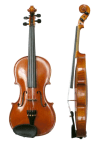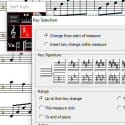
C Instruments
Many of the songs here on the site include obbligatos that specify the use of a “C instrument.” People often write to ask, “What exactly is a C instrument?”
So without further ado…
![]()
A “C instrument” is any instrument that plays a real, honest-to-goodness C when it encounters a C on the staff.
Sometimes the instrument will sound in an octave other than the one you expect, but in spite of this liberty, it’s still a C instrument. Even violas, who insist on a clef of their very own, are C instruments.

If that list is too long, the C instruments I most often write for are Violin, Cello, Flute, and Oboe, with some chimes thrown in here and there. They are sometimes interchangeable, sometimes interchangeable with a few adjustments, and sometimes interchangeable if you don’t mind annoying the player mightily and/or providing chocolate.
If an instrument isn’t a C instrument, it’s a transposing instrument. These renegades see what cellos and flutes and oboes render as real Cs, and make some other sound. When you listen to an orchestra, a substantial number of the instruments are doing this. Actually, they do it for every note, C or not. The grand thing is that somehow, like magic, it works.
I don’t often specify obbligatos for transposing instruments, although some of the obbligatos would sound just fine played on a horn or clarinet or alto flute or… If you have such instruments at your disposal, you can transpose the obbligatos using the Personal Composer files/demo. Some players are skilled enough to read the obbligatos as written and transpose on the fly, but don’t push your luck.
 A related question that comes up is, “Will this obbligato sound good on a…” Unless the sentence ends in “kazoo” or “washboard,” give it a try and see if you like it. If the obbligato specifies “C instrument,” it’s probably simple enough to sound reasonable on any of the more commonly-available instruments. If it specifies a “Flute” or “Violin” (or whatever) chances are I was after a particular sound or wrote in a particular register–-though that doesn’t mean it won’t work on other instruments. The bottom line here is… if you like it, use it!
A related question that comes up is, “Will this obbligato sound good on a…” Unless the sentence ends in “kazoo” or “washboard,” give it a try and see if you like it. If the obbligato specifies “C instrument,” it’s probably simple enough to sound reasonable on any of the more commonly-available instruments. If it specifies a “Flute” or “Violin” (or whatever) chances are I was after a particular sound or wrote in a particular register–-though that doesn’t mean it won’t work on other instruments. The bottom line here is… if you like it, use it!


Could a recorder be used as a C instrument? Like the simple ones children sometimes learn to play in school?
I appreciate this is a 3 year old comment and it might not be pressingly important anymore but the recorder you learn at school (the descant/soprano) is a C instrument, as is the tenor. The Treble/Alto and Bass recorders are, I suppose, F instruments but recorders are “non-transposing” instruments so the music is the same as if it was for a C instrument and the musicians just have to learn to deal with that inconvenience 😉
Sally, This is not boring at all – at least for me. I am comparatively new to the world of conducting women’s voacl groups, yet still find arrangements which also include flute or violin obligatos. I am printing this to include in my small portfolio in order to remind myself of this info.
Your free arrangments for my stake women’s choir – which only gathers together these days after much encouragement – are too few for me. I am greedy and am always on the look-out for them! Thank you so very much for all that you do for those of us who love to sing to our Heavenly Father.
Winston, Oregon Ward
Great information! Thank you ! Thank you !